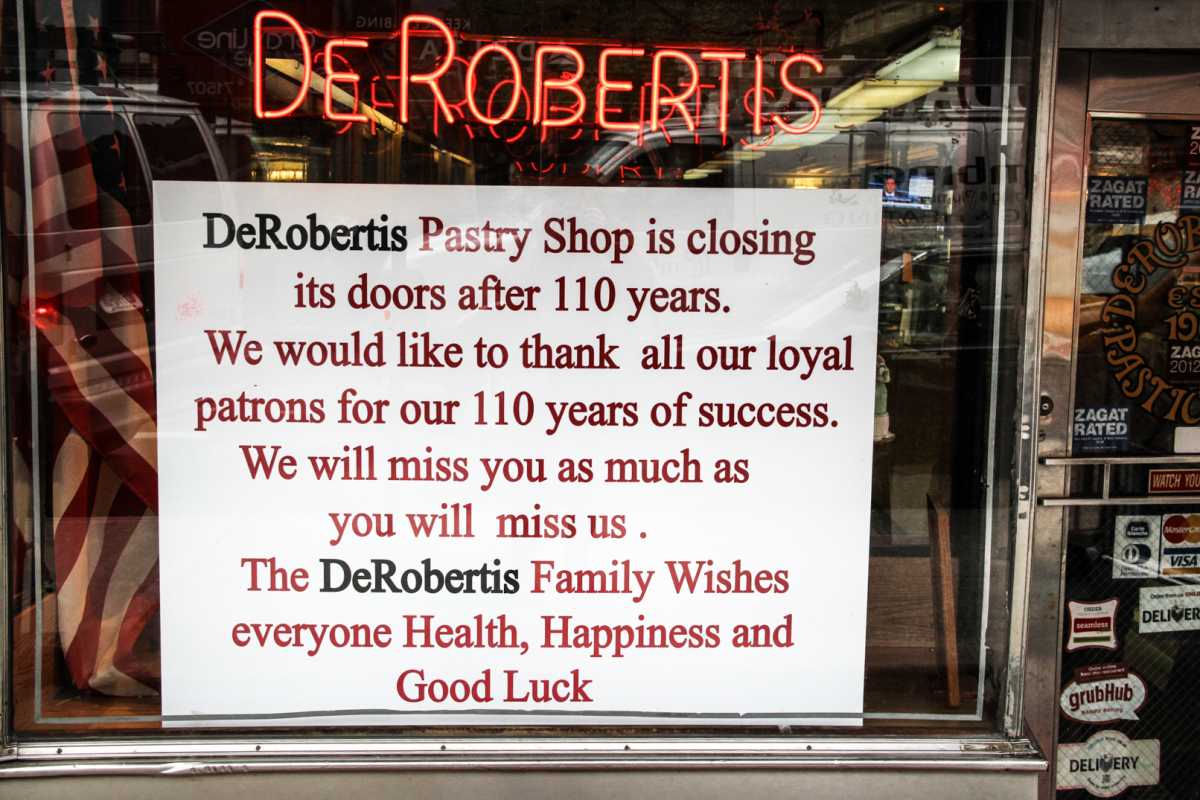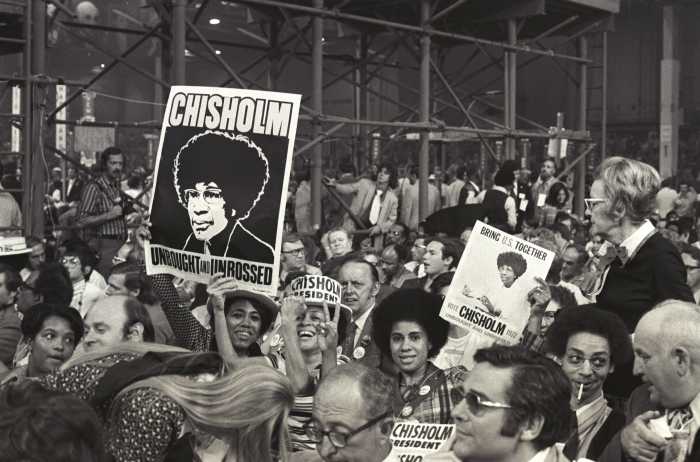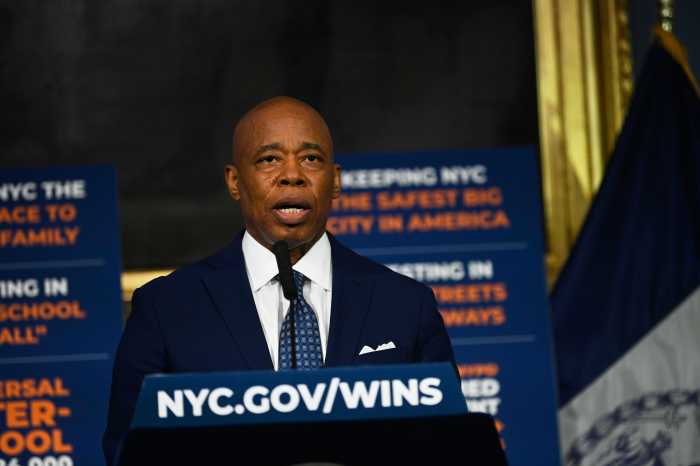
BY SHARON WOOLUMS | Government is quick to act to save big business, even in cases when the latter’s own greed is the cause of its demise. Government’s justification for immediate solutions — for using taxpayer money to save big business — to maximize these companies’ profits is that they are “too big to fail” and vital to our economy. Meanwhile, long-established, healthy small businesses are forced to close in record numbers. Are they too small to save?
As the number-one employer of resident New Yorkers for more than 26 straight years, small businesses are not small when it comes to jobs. They are the number-one pathway for social mobility for low-income families, and their impact is not small when it comes to helping provide neighborhood stability that gives character to a community.
And these small merchants are not small in courage when they go into neighborhoods that others have abandoned, risking their lives, savings and futures by investing in that community.
‘Today, small businesses have zero confidence that government will stand up to big real estate.’ — Sung Soo Kim
More important, they are not small in establishing New York City as the gateway to America for more than 400 years, the city of entrepreneurs and dreamers hoping to invest in the American Dream.
They are indeed the “backbone of our economy and engine for job creation,” as every elected official’s campaign literature tells us. When then have so many of our politicians remained silent about finding solutions to stopping these businesses’ closings and saving jobs?
The answer may be simple: Small businesses are small when it comes to campaign contributions. With big real estate PACs contributing huge amounts to candidates who continue making the real estate industry the number-one priority in New York City, landlords are not small at election time. No candidate made the closing of neighborhood businesses and the loss of jobs a serious issue in the last election. In fact, some claimed the number-one problem was “excessive tickets and lack of affordable loans.” Facing a crisis and going extinct, no small business would say they are going out because of fines from tickets.
Our unresponsive elected officials have turned a blind eye to the most obvious problem facing us today. Small businesses cannot compete with big banks and big franchises able to pay exorbitant rents. Will it take the Village streets filled with empty stores looking like a Detroit shopping strip, and the middle class forced out due to high costs for our elected officials to exert their political will and finally do something to stop the closings?
The community response to my recent Sept. 11 talking point (“There’s only one way to save our small businesses”) — the fifth of that series on this issue — was overwhelming. However, many felt that our elected officials’ silence over this crisis is deafening. They feel the crisis is now, that there is no time to speculate. The cash flow into campaign coffers must never drown out the candidates’ desire to hear those desperate to save their communities. A basic tenet of democracy is that voters have a right to know the position of their elected officials on this urgent need to act. So, for this current column, I asked our local politicians to comment.
Responding to their comments is Mr. Sung Soo Kim. He has been in the trenches on this issue for 30 years, and here will assist in giving a fair and accurate evaluation of their comments. As founder of the Korean American Small Business Service Center, first chairperson of Mayor Dinkins’s and Giuliani’s Small Business Advisory Committee, and co-founder of the Small Business Congress, Kim created the first Small Business Bill of Rights in New York City.
Councilmember Corey Johnson: “It is critical for the City Council to take an active role in combating the continuing demise of local businesses due to ever-rising rents. In many neighborhoods, small businesses have fallen victim to the very revitalization and growth they helped germinate. It is an unfortunate reality that true commercial rent control remains outside the purview of the Council, and so instead we must look to other creative strategies to ensure that price-gouging does not persist.
“Proposals to create a mechanism for landlords and commercial tenants to mediate disputes over lease renewals are a salve but not a solution. Commercial rent control enacted by the New York State Legislature enjoyed a successful 18-year run in the mid-century before it sunset, and should be resurrected for the preservation of our communities.”
Sung Soo Kim’s response: “I commend Councilmember Johnson on publicly declaring rising rents the cause of the ‘demise’ of local businesses. Too many elected officials and governmental agencies refuse to recognize this undeniable fact, but I totally disagree with his assessment that “proposals to create a mechanism for landlord and commercial tenants to mediate disputes over lease renewals are a salve not a solution.’
“What Johnson is referring to as ‘not a solution’ is the Small Business Jobs Survival Act (S.B.J.S.A.), which has been bottled up in a Council committee for the past four years, and denied a vote by the full City Council for 28 years. Since the bill has never been enacted into law, how can Johnson presume it will not be a solution to stopping the closing of small businesses upon lease renewal?
“The statements from our business community over the decades make clear that they strongly believe this bill is the only real solution to keeping them in business and saving New Yorkers’ jobs. From the original bill’s first June 1986 public Council hearing till the last, in June 2009, every legitimate New York City business organization and advocacy group, including arts and nonprofit organizations, has testified that this bill, based upon giving rights to the commercial tenant and arbitration if the parties fail to reach agreement, was the best solution to stopping the closing of established businesses.
“Not just the businesses believed this: At the June 29, 2009, hearing on the bill, then-chairperson of the Committee on Small Business, David Yassky, said: ‘I believe that we absolutely have to do something period…before our small businesses disappear… . It’s not an option to do nothing… . If it’s not going to be this bill, then I want to hear what the alternatives for how we’re going to help small businesses in this difficult time… . We have to have some solutions to offer.’
“After hearing all testimony and recommendations, Chairman Yassky and every member of his Small Business Committee sponsored the S.B.J.S.A. as being the best solution to stopping the closings.
“Johnson is misguided in recommending that commercial rent control be brought back to save small businesses. In the 1980s the reinstatement of the successful commercial rent control law was considered by then-Assemblymember Jerrold Nadler and then-Councilmember Ruth Messinger, who introduced ‘commercial rent control’ legislation both in the state Assembly and City Council. The city’s business community instead unanimously supported an arbitration bill.
“After listening to the arguments from the small business advocates, both Nadler and Messinger dropped their ‘commercial rent control’ bills in favor of adopting arbitration legislation. The reason: arbitration has evolved into being universally accepted as the best resolution dispute process available.
“The small business community trusted the elected officials who first introduced the bill to stand up to the real estate speculators and treat the businesses fairly. The creators of the commercial rent control bill were Mayor Fiorello LaGuardia, recognized as our greatest mayor, and Governor Thomas Dewey, a former Manhattan district attorney who built a reputation on cleaning up corruption and crime in New York City.
“Both LaGuardia and Dewey were Republicans who were opposed to the corrupt Democratic political machine run by Tammany Hall. They built reputations that the people’s jobs came first, not the political bosses. Today, small businesses have zero confidence that government will stand up to big real estate and stand behind the small business owners and their workers.
“Seeing the huge campaign contributions made by real estate PACs gives small business owners little confidence that their government can be trusted to stand up to the powerful real estate industry’s influence and pass legislation to protect them, as did LaGuardia and Dewey.
“My recommendation to Councilmember Johnson: Log onto savenycjobs.org and read the intent of the S.B.J.S.A. legislation. Copy the summary of what the bill will do and give it to other legislators who are concerned about the fate of small businesses. Take copies to the owners of your districts’ small businesses, and ask them if this would be a solution to the crisis they face.”
Before finalizing this article for publication, I went online to check the latest sponsorship of the S.B.J.S.A. In turns out that on Nov. 25 Johnson signed onto the measure, the same bill he previously said he could not support because he felt it was “a salve but not a solution.”
So I gave Johnson an opportunity to answer: “What changed your mind?”
Johnson: “I continue to feel that proposals like Intro 402 are a salve not a solution. But given the rapid erosion of our small businesses, we must embrace measures like these for the benefits they provide.”
Sung Soo Kim’s response: “The mark of leadership is how an elected official deals with a crisis facing his or her community. Will they stand behind the community against political pressures or special interests’ influence and do the right thing?
“If Councilmember Johnson feels the S.B.J.S.A. is not the best solution, he should never have sponsored the bill — and he should withdraw his name from the bill! The small business owners in his district and their loyal customers deserve real solutions to their problems. This is why the majority voted for Johnson — to be independent and fight for real solutions.
“Why can’t he work with the small business advocates to recommend changes to the bill that would make it a real solution to stopping the closing of small businesses? Are there no compromises possible with Intro 402 that would make it work better for his businesses?
“This bill, S.B.J.S.A., is very simple, it gives rights to the business owners when their leases expire. The real estate lobby does not want to give any rights to the business owners and wants only the landlords to have all the rights to determine all the terms of the new leases.”
Councilmember Margaret Chin: “I am deeply concerned about the difficulties faced by the valuable small businesses that make our community great. Since ever-rising rents contribute to the closure of so many small businesses, I continue to co-sponsor the Small Business Jobs Survival Act, which would create fair rent negotiations and help save many of these beloved stores.”
Sung Soo Kim’s response: More than 20 years ago, I represented the Korean businesses in fighting to stop rent gouging. Margaret Chin was the advocate and voice fighting for economic equality for the Chinese community. Ms. Chin never missed an opportunity to speak with conviction and compassion on the need to protect small businesses and the jobs they created because of the importance of jobs to an immigrant family’s future.
“In 2011, because of her long history as an effective advocate, now-Councilmember Chin was named prime sponsor of the S.B.J.S.A. and entrusted with the responsibility of gaining a vote on it by the full Council. Now with Chin as a co-sponsor of the bill, the small business community hopes she will bring to the Council’s Progressive Caucus her vast knowledge of the crisis faced by our city’s immigrant businesses and the disgraceful anti-democratic treatment they received from our government when they sought economic justice in the City Council. It is inconceivable, that any ‘progressive’ councilmember — after learning of the many immigrant owners routinely extorted for cash by unscrupulous landlords under the threat of losing their businesses — would purposely not take any action to stop this appalling act.”
Councilmember Rosie Mendez, our other Downtown Council rep, has also recently signed on as a sponsor to the latest version of the S.B.J.S.A. However, she did not respond to requests for comment for this column, saying she was “too busy to comment at this time.”
Sung Koo Kim’s response: “Twenty years ago, the most active fighters for our cause came from the Village representatives, Councilmembers Miriam Friedlander and Carol Greitzer. Having the courage to stand up to the powerful speaker of the City Council, Peter Vallone, who led the fight to defeat the original arbitration bill, they could not be silenced in standing up for the small businesses, the art community and the spirit and the unique character of the Village and Lower East Side.
“The S.B.J.S.A. today was the same bill Mendez’s predecessor, Margarita Lopez, introduced as prime sponsor in 2005. Lopez had renamed the bill the Jobs Security Act because she knew this bill would determine the future of many New Yorkers’ jobs. Mendez has been a co-sponsor of this bill twice before, and has again signed onto it as a sponsor.
“Now that the problem is worse, Villagers are demanding that elected officials make a loud noise and call to stop these closings before we lose all our small businesses. Hopefully, Mendez will listen to her constituents and remember the populist action taken by true progressive legislators, like former Councilmembers Friedlander, Greitzer and Lopez.”
In this, The Villager’s sixth column on this topic, we move past the explanations — to the solution. Something has broken — it needs fixing. Doing nothing has made the crisis worse.
This is not some Republican enclave! This is the Village, with its progressive Democratic political clubs and ideals! Has the meaning of “progressive” changed? Has the ideal become merely a myth, an illusion, a quaint relic of the past — just as our Village is becoming?
Countries yearn for democracy. They fight and die for it. Yet we delude ourselves by thinking that, if we complain and moan long and hard enough, change will magically happen.
But with democracy comes responsibility. We have a process in place. In one of my previous columns on this issue last year, I called it THE litmus test for the election of progressive candidates. Sadly, once elected, however, many “progressives” become followers of the political machine. That’s why it is our responsibility to encourage them to comment.
Voters must act by all means possible: e-mail, tweet, phone, Facebook, petition and write letters to the editor. It takes 26 City Council votes to follow the will of the people and pass legislation that will save our small businesses. As for the Village — and the rest of New York — if this crisis does not end now, we won’t recognize this unique place we call home.































